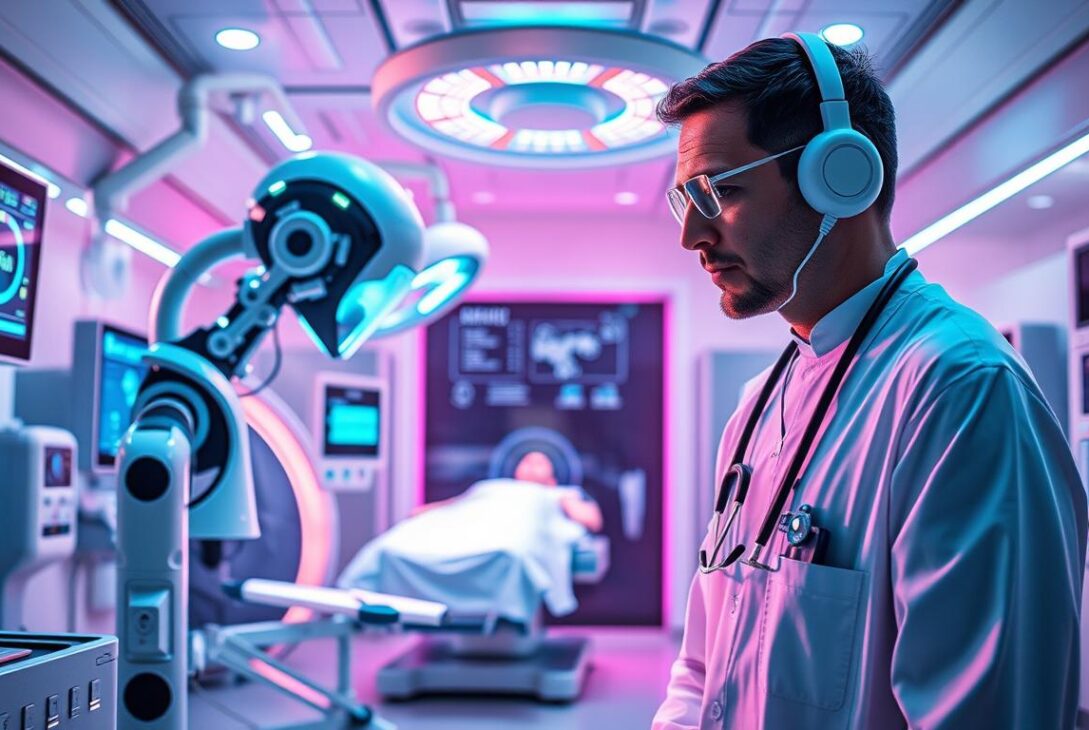Artificial Intelligence is changing the healthcare world. It’s bringing in a new era of Medical Technology and Healthcare Innovation. AI can look at huge amounts of data. This helps doctors make better diagnoses and create treatment plans that fit each patient.
Artificial Intelligence is making a big impact on healthcare. Medical Technology is leading this change. Thanks to Healthcare Innovation, doctors can now give better care and see better results. In this article, we’ll see how Artificial Intelligence is changing medicine.
Key Takeaways
- Artificial Intelligence is transforming the healthcare industry
- Medical Technology is improving diagnosis and treatment
- Healthcare Innovation is enhancing patient care and outcomes
- Artificial Intelligence can analyze vast amounts of medical data
- Personalized treatment plans are becoming more effective
- Medical professionals are adopting Artificial Intelligence for better care
The Revolution of AI in Medicine
Artificial intelligence is changing medicine a lot. Machine Learning is leading this change. It lets computers learn from data on their own, making Medical Imaging better, diagnosing diseases, and creating treatment plans for each patient. This could make healthcare better and more efficient.
AI is making a big difference in healthcare. Technologies like deep learning and natural language processing help doctors analyze images, find diseases, and plan treatments. For example, AI can help doctors spot cancer early and accurately, which can lead to better treatment results.

- Improved diagnosis accuracy
- Enhanced patient outcomes
- Increased efficiency in healthcare services
- Personalized treatment plans
As AI gets better, we’ll see more new uses in Healthcare Delivery. We’ll see robots helping in surgery and better predictive tools. With Machine Learning and Medical Imaging leading the way, the future of medicine looks very promising.
| Technology | Application | Benefit |
|---|---|---|
| Deep Learning | Medical Image Analysis | Improved diagnosis accuracy |
| Natural Language Processing | Personalized Treatment Plans | Enhanced patient outcomes |
Transforming Disease Diagnosis and Prevention
Disease diagnosis is key in healthcare, and Medical Research is changing it a lot. Predictive Analytics helps doctors look at lots of data. They find patterns and predict what might happen to patients. This lets them spot at-risk patients and stop diseases early.
Using Predictive Analytics has many benefits. It helps find diseases early, leading to better treatments. It also makes patients’ lives better by stopping diseases and their problems.

Medical Research also finds new ways to treat diseases. This means patients get better care and live better lives. With Predictive Analytics, researchers can find risks and make plans just for each patient. This is changing how we fight diseases, making care more effective.
| Disease | Diagnostic Method | Predictive Analytics |
|---|---|---|
| Diabetes | Blood tests | Risk factor analysis |
| Heart Disease | Imaging tests | Predicting patient outcomes |
| Cancer | Genetic testing | Identifying high-risk patients |
By using Predictive Analytics and Medical Research, doctors can change how we diagnose and prevent diseases. This leads to better health for patients and a better life for everyone.
AI-Powered Medical Imaging and Analysis
Medical imaging is key in healthcare, helping doctors diagnose and treat diseases better. The use of Artificial Intelligence (AI) in medical imaging has changed radiology a lot. AI makes image analysis faster and more accurate, helping doctors spot diseases early.
AI in Medical Imaging has also led to new Radiology tools. These tools can read images quicker and more accurately than doctors, cutting down on mistakes. Also, 3D Imaging lets doctors see the body in more detail. This leads to better diagnoses and treatments.
- Early detection of diseases
- Improved accuracy of image interpretation
- Enhanced patient outcomes
- Increased efficiency in radiology departments
As AI keeps getting better, we’ll see more changes in medical imaging. The mix of AI in Radiology and 3D Imaging will likely make diagnoses and treatments more precise. This will improve patient care and change healthcare for the better.
Personalized Treatment Plans and Drug Development
Personalized Medicine is changing how doctors treat patients. They use genetic data, medical history, and lifestyle to make plans just for each person. This leads to better health and a better life for patients.
AI is speeding up Drug Development in Medical Research. It looks through lots of data to find new treatments. This means doctors can give patients treatments that really work.
Some great things come from Personalized Medicine and AI in Drug Development:
- Improved patient outcomes
- Enhanced quality of life
- Increased efficiency in Medical Research
- Targeted treatments and therapies
As Medical Research gets better, AI will play an even bigger role. Doctors will be able to give patients care that really fits them. This will lead to better health and a better life for everyone.
Robot-Assisted Surgery and AI Integration
Robot-Assisted Surgery is changing how we do Surgical Procedures. It uses AI to make operations more precise and accurate. This method lets surgeons do complex surgeries with less invasion, cutting down recovery time and boosting patient results.
One big plus of Robot-Assisted Surgery is its ability to do delicate surgeries with better precision. This is crucial in neurosurgery and cardiothoracic surgery, where small errors can lead to big problems. AI systems can quickly analyze data, giving surgeons vital info to make better choices.
AI also helps in tracking how patients recover and spotting any issues early. This lets doctors take action quickly, lowering the chance of bad outcomes and bettering patient care. By combining Robot-Assisted Surgery with AI for Recovery Monitoring, healthcare can offer better and more efficient care.
| Benefits of Robot-Assisted Surgery | Description |
|---|---|
| Improved Precision | Enhanced accuracy and precision in Surgical Procedures |
| Reduced Recovery Time | Minimally invasive procedures reduce recovery time and improve patient outcomes |
| Enhanced Recovery Monitoring | AI-powered systems track patient progress and identify potential complications |
Robot-Assisted Surgery and AI are making healthcare better. They help doctors provide top-notch care that leads to better patient results and fewer problems. As this tech keeps getting better, we’ll see even more cool uses of AI in surgery and recovery tracking.
Electronic Health Records and Predictive Analytics
The use of Electronic Health Records (EHRs) and Predictive Analytics is changing healthcare. They help doctors find patients at risk and create better care plans. Predictive Analytics is key, helping doctors predict patient needs and tailor treatments.
Benefits of EHRs and Predictive Analytics include:
- Improved patient outcomes through data-driven decision making
- Enhanced patient care through personalized treatment plans
- Increased efficiency in healthcare delivery through automated processes
Studies show EHRs and Predictive Analytics can cut hospital readmissions and boost patient happiness.
As healthcare evolves, EHRs and Predictive Analytics will become even more vital. They help doctors find new ways to care for patients, leading to better health and a more efficient system.
Doctors can use Healthcare Data and Predictive Analytics to stay on top of care. This mix is set to change healthcare forever, with lasting effects.
Ethical Considerations and Patient Privacy
As AI becomes more common in healthcare, keeping Patient Privacy is crucial. Doctors and nurses must make sure patient data is safe and follows the rules. They need to use strong Data Security to keep sensitive info from getting into the wrong hands.
Healthcare groups must follow strict Regulatory Compliance rules for keeping data safe. This means getting patient consent and being open about how data is used. By focusing on Patient Privacy and Data Security, doctors can gain their patients’ trust and use AI wisely.
- Implementing secure data storage and transmission protocols
- Conducting regular security audits and risk assessments
- Providing patients with clear information about data usage and consent
By tackling these ethical issues and putting Patient Privacy first, healthcare teams can use AI’s benefits. They can do this while keeping their patients’ trust and confidence.
The Future of Healthcare with AI
AI is changing healthcare in big ways. Emerging Technologies are making patient care better and outcomes more positive. AI can help a lot in diagnosing, treating, and preventing diseases.
But, using AI in healthcare comes with challenges. Issues like data integration, making systems work together, and keeping data safe need to be fixed. Still, AI’s benefits for Global Healthcare are clear, and its impact will be big.
AI will make a big difference in several areas:
- Predictive analytics and personalized medicine
- Medical imaging and diagnostics
- Robot-assisted surgery and patient care
As AI grows, we’ll see even more new uses in healthcare. The future of healthcare with AI is promising. It will be exciting to see how Emerging Technologies change the industry.
| Technology | Application | Impact |
|---|---|---|
| AI-powered chatbots | Patient engagement and support | Improved patient outcomes and experience |
| Machine learning algorithms | Disease diagnosis and prediction | Early detection and treatment of diseases |
| Robot-assisted surgery | Minimally invasive surgical procedures | Reduced recovery time and improved patient outcomes |
Conclusion
The use of AI in medicine is growing fast. New healthcare innovations and medical tech are changing how we treat patients. AI is making disease diagnosis better, treatments more personal, and surgeries more precise.
But, we face challenges like keeping data safe, following rules, and winning patient trust. Still, AI’s benefits in healthcare are clear. Patients will get better diagnoses and treatments tailored just for them. This means better health and happiness for everyone.
Healthcare workers will also get a big boost. They’ll be able to give better care, work more efficiently, and save money. This is a bright future for healthcare, thanks to AI.
FAQ
What is the role of AI in transforming disease diagnosis and prevention?
AI is changing how we diagnose and prevent diseases. It looks at lots of medical data, finds patterns, and predicts outcomes. This helps doctors spot high-risk patients early and prevent diseases before they start.
How is AI-powered medical imaging and analysis revolutionizing the field of radiology?
AI is making medical imaging better and faster. It helps doctors see diseases early and avoid mistakes. Also, new 3D imaging lets doctors see the body in more detail, leading to better treatments.
What is the impact of AI on personalized treatment plans and drug development?
AI is making treatments more personal. It looks at a patient’s genes, medical history, and lifestyle to find the best treatments. It’s also speeding up the discovery of new drugs, improving patient care and life quality.
How is robot-assisted surgery and AI integration enhancing surgical procedures?
Robot-assisted surgery is getting better with AI. AI makes surgeries more precise and accurate. It also helps track patient recovery and improve surgical skills, leading to better outcomes and fewer complications.
What are the ethical considerations and patient privacy concerns surrounding the use of AI in healthcare?
AI in healthcare raises big questions about ethics and privacy. Doctors must keep patient data safe and use it with consent. New security measures and rules are being made to protect patient data and ensure privacy.
What are some of the emerging technologies and implementation challenges in the future of healthcare with AI?
The future of healthcare with AI is exciting. New tech like blockchain and 5G could improve care. But, there are challenges like integrating data and keeping it safe. AI has the power to make healthcare better, cheaper, and more effective.



















